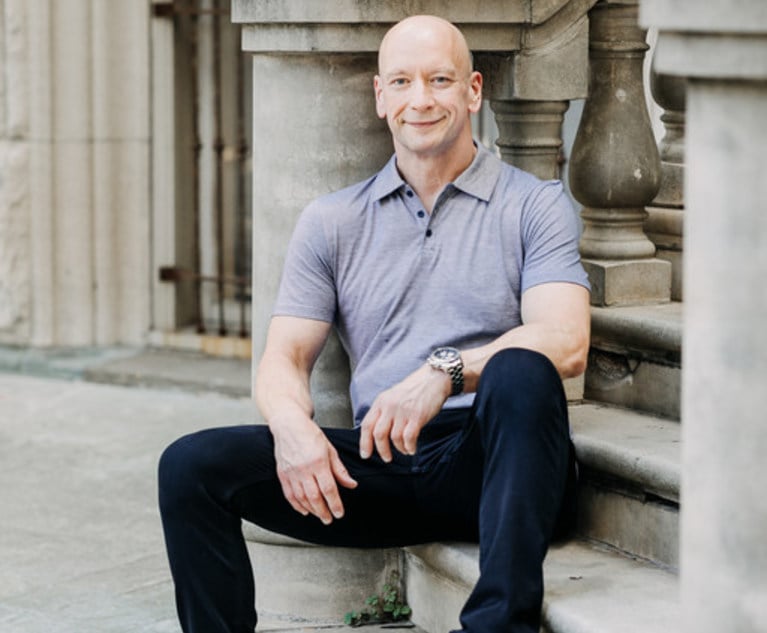When I started at The Legal Intelligencer on July 6, 1993, I was 23 years old, Bill Clinton was only a few months into his first term, grunge was still a thing and ”Friends” hadn’t even premiered yet. I worked off a DOS-based program. I didn’t have a cellphone or the internet or email, and all I knew about the law was what I had picked up being a police reporter in Montana. Oh, and I still had hair.
Just a few weeks after I started, the company threw an event at the Union League and presented an award to A. Leon Higginbotham, the former U.S. Court of Appeals for the Third Circuit judge and a legal giant. My only experience with awards prior to that had been football and sports award ceremonies, like the Maxwell Club. I figured it was kind of the same thing. So when Higginbotham walked by, I did what I had done at countless football banquets: I slapped him on the back and cried out: “Congratulations!”
I learned quickly that you did not slap someone like Higginbotham on the back.
He was a tall man, and he turned around quickly and gave me a look that could have withered a large oak tree. Lesson learned.
I have no doubt that a few of my co-workers at the time probably didn’t think I’d last a year, much less 30 years.
And yet, somehow, I did.
When people used to ask me why I stayed so long, my answer was always the same: “I liked the work, the people, and they kept promoting me.”
But after more than 30 years, it’s time to leave. It seems fitting that I’m leaving as The Legal, the oldest daily legal newspaper in the U.S., ceases print. I’ve had a good run at The Legal (and ALM, the parent company). I came in as an entry-level reporter in Philadelphia and I’m leaving having overseen ALM’s U.S.-based legal newsroom for more than six years. But nothing lasts forever, particularly for editors-in-chief. So come January 2024, I’ll be leaving behind the longest association I’ve had with any institution or group of people other than my family and closest friends and looking for something new.
As I’ve talked to friends and associates about the change, I’ve been asked whether I’m nostalgic. Truthfully, I’m not that nostalgic. I’ll miss analyzing web metrics and working on our editorial strategy and talking to reporters and editors about connecting the dots and story ideas. But when it’s time to move on, I don’t really look back. There’s no point. It’s over.
Gratitude
That doesn’t mean that I don’t have emotions. I have plenty. Most of all, I feel a profound sense of gratitude. Gratitude for the people who’ve worked so hard for me over the years. I couldn’t have asked for a better team.
And I’m also very grateful for the legal community, particularly the Pennsylvania legal community, who gave me so much of their time, insight and feedback over the years. There are so many people I learned from, and who showed me kindness.
I’d love to name them and thank them publicly. There are only two problems with that. First, the list of names of the people I’m indebted to would take up a whole column. And second, I would never want to expose any of my sources—and more than a few of those folks were that.
In my time here, The Legal has won a lot of awards and broken a lot of big, important news stories. I always strived for The Legal—and ALM—to be more than it had been. I was hungry for the challenge, and now that my time is over, I don’t have any regrets. None of it would have been possible without the hard work of my team, or the insights and feedback from the legal community.
The Best Team
The most rewarding part of my time at The Legal, other than learning something new every day, was working with the newsroom. I was lucky. I hired well, and I knew how to develop talent. I learned a valuable lesson: if you invest in good people—and I mean truly invest in them and their future and help them improve, not just tell them nice things when you want something from them—they will repay you 1,000 times over.
There is something so inspiring about watching good people develop and perform at a high level, and then watching them accomplish everything you can throw at them.
Over the years, I got asked to do a lot of difficult tasks, some of them essentially impossible (“Like what?” you ask. How about rewriting and editing a 700-page tax handbook in 19 days. And it was actually more complicated than that). I was able to do it because I had a team that did anything I asked and they always did it with a positive attitude. I’m sure the newsroom will continue to operate like that after I’m gone.
Some newsrooms are very toxic. Snarky, petty, combative. That hasn’t been the case here. I can’t say enough good things about the people I worked with. They were dedicated to doing better every day, both collectively as a newsroom, and as individuals. It made all the difference.
A Few Anecdotes
Looking back over the past 30 years, a few memories stick out. If you’ll forgive the indulgence, here are a few:
Jesus Christ, Part One
The most rewarding personal reporting experience of my career was the work The Legal did on the Luzerne County judicial scandal. We were the first to report on alleged case-fixing and ties the one judge had to the Mob, among other things. Over the course of our work, we got tipped off that the feds had subpoenaed a bunch of row offices at the courthouse. Someone suggested that we file a Freedom of Information request with the courthouse. The idea is that if we got copies of all the subpoenas, we would have a sense of how broad the investigation was, and if it included other lawyers and row officers. So we did. At some point, one of our sources at the courthouse called reporter Leo Strupczewski, my co-writer on most of our stuff.
“Jesus Christ, Leo, who did you guys piss off?” the source said. “The feds are all over the courthouse. They’re handing out a secret order that forbids people from sharing the subpoenas or even talking to you or even letting you know about the existence of the order. In fact, I shouldn’t be talking to you.”
The source hung up abruptly.
We managed to get a copy of the order about a week later after we visited the courthouse.
Jesus Christ, Part Two
Our other big scoop in the Luzerne judicial scandal was revealing that the Pennsylvania Judicial Conduct board received a detailed complaint against the judges—it laid out all the general allegations and connections that were later revealed in the indictments and press coverage—three years before they were indicted and did nothing about it. Once we confirmed everything, I made two calls. One was to one of my best sources, the other was to a spokesperson for the Pennsylvania Supreme Court, which oversees the judicial conduct system. When I told them what we had, the responses were nearly identical:
“Jesus Christ!”
There might have been a few choice words added between and after those words.
I called another source, with ties to the judiciary, and told them what we had.
“Hank, I think your lives are in danger,” the source said.
The source was a very sober one, not given to hyperbole, but I laughed it off. Upper management got wind of the comment, though, and one of the VPs at the time called me to tell me they were beefing up security at the office.
Pete Rozelle Moment
I took a lot of heat for ripping the Pennsylvania Supreme Court for its decision to uphold a judicial pay raise. The heads of all the major state bar associations, particularly the Philadelphia and Pennsylvania Bar associations, wrote letters to the editor ripping my column, most of them focusing on my “nonlawyer” status.
Months later, I won a Schnader Print Media award. The person who had to give the award to me was Kenneth Horoho, who as PBA president, had authored one of those letters.
I said to him beforehand: “Do you feel like Pete Rozelle giving the Lombardi Trophy to Al Davis after he sued the NFL?” Ken laughed. We had a good conversation, the first of many. It was a valuable lesson for me in the importance of engaging people, even if you initially disagree vehemently on something.
Sidenote: While 2023 Hank would temper some of the language in 2006 Hank’s pay raise column, every dire prediction I made about the consequences of the court’s decision came true.
The Cookies
The public relations great Ellen Toplin used to send a huge box of amazing cookies to The Legal every holiday season. The cookies were wrapped in pairs in cellophane. The newsroom looked forward to them every year. They were that good. The most prized cookies were the chocolate chip, the chocolate chunk and the M&M cookies.
But a problem developed. Some people—namely one former editor who has since passed away—would grab all the good cookies and leave none for the rest. So I started keeping the box in my office, so I could police things and make sure no one person took more than their fair share. It seemed to be working.
Then one day, I had a lunch meeting. I did a count before I left. There were still plenty of the best cookies.
When I came back, every single pack that had any variation of chocolate was gone. I was upset. It wasn’t fair to the team.
One of my people heard me complaining and came to me laughing.
She said that the editor in question had walked out of my office and then past her office and “he was crinkling loudly.”
The cellophane wrapping had given him away.
I walked down to the editor’s office and busted him. He was the adult equivalent to the kid caught with his hand in the cookie jar. I made him hand over the cookies.
After that, I started locking the cookies in my office when I wasn’t there.
A Few Bits of Advice
Over the years, I’ve had to manage a pretty big team under constant pressure and change, and I like to think I’ve learned a few things that I’ll pass along. These are sayings I’m sure some of my folks are tired of hearing, but they served me well and maybe you’ll get something out of them:
- “Hire future generals as privates.”
- “Hire for attitude and train for skill.”
- “The status quo is not an option.”
- “Improve or die.”
- “Everyone has to do the grunt work, but everyone also gets a shot at the glory work.”
- “There’s no defense against excellence.”
- “Turn critics into acolytes.”
- “Train everyone up.”
- “It is better to be an optimist and risk being disappointed by life than to be a pessimist and guarantee it.”
- “The goals are non-negotiable. But as long as you’re not inefficient or unethical, I don’t care how you get from A to B.”
- “Talk your people up.”
- “If your only value to the team is that you’re the only one who knows how to do it, then you’ve got an expiration date stamped on your forehead.”
- “Always think about who is next in line.”
- “Always think about potential next steps for your people.”
One Last Word
I’ve said this for years, and I’ll say it again: lawyers (and journalists) are among some of the very best and very worst people I’ve ever met.
Fortunately for me, I’ve encountered far more good lawyers (and journalists) than bad ones over the years. Lawyers and judges and journalists are, in a sense, professional second-guessers, which annoys a lot of people.
But they are also guardians of our democracy. And for that, you have my admiration and gratitude.
Thank you to my team. Thank you to the legal community. Be well. This probably isn’t a true goodbye, though. Because after 30 years, I am still very much hungry for a new challenge.
NOT FOR REPRINT
© 2024 ALM Global, LLC, All Rights Reserved. Request academic re-use from www.copyright.com. All other uses, submit a request to [email protected]. For more information visit Asset & Logo Licensing.


 Hank Grezlak. Courtesy photo
Hank Grezlak. Courtesy photo






